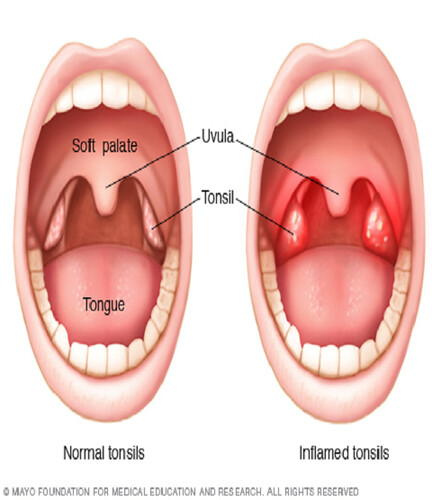
The symptoms of tonsillitis are similar in children and adults, but the condition takes longer to recover in adults. The infection usually consists of red, swollen, and painful tonsils. A thorough physical examination by a doctor can determine if you have a virus or bacteria that is causing the inflammation. If the pain and swelling are accompanied by fever and chills, you may have a more serious case of tonsillitis.
The good news is that treatment is generally quick and effective for acute tonsillitis. Treatment is not too difficult and the vast majority of patients recover completely without any complications. In some cases, chronic tonsillitis is not curable and may require surgery. However, the symptoms may be more severe than acute tonsillitis, which often is more serious. You can still suffer from the symptoms of tonsillitis without having any underlying medical conditions. The best option for chronic tonsillitis is to see a doctor as soon as possible.
In addition to the symptoms, there are a variety of treatments available. Over-the-counter pain relievers and home remedies are two of the most popular options for treating tonsillitis. A cold or flu-like illness will only relieve the pain and discomfort. Antibiotics will not cure your tonsillitis; they will only help with the symptoms, and they can cause other complications. In some cases, people may only need a prescription to treat their tonsillitis.
Treatment for tonsillitis will vary depending on the cause of the illness. In many cases, antibiotics will be prescribed as a one-time injection or as pills. If you experience symptoms for longer than three days, you may need surgery to remove the tonsils. You should get treatment as soon as possible after you start feeling better. A doctor can give you a prescription for the antibiotics. You should take these medications for the full duration of the infection.
Treatment for tonsillitis depends on the cause of the infection. The infection is caused by a virus that is present in the throat and causes the symptoms to be persistent. Symptoms of tonsillitis include coughing, chest pain, and a stuffy nose. It’s recommended to stay hydrated, take over-the-counter pain relievers, and rest. Most of the time, treatment for tonsillitis is the same, regardless of whether you have a viral or bacterial type of tonsillitis.

Your doctor may prescribe antibiotics for various conditions. Viral tonsillitis usually goes away on its own with hydration, pain management, and over-the-counter pain relievers. If you have bacterial tonsillitis, your doctor will prescribe antibiotics, which won’t cure the infection but will help you recover faster. In addition to speeding up the healing process, antibiotics can prevent bacterial complications such as rheumatism.
Treatment for tonsillitis depends on the cause of the disease. Tonsil infections can cause pus to collect behind the tonsils, which can lead to a peritonsillar abscess. This infection may require a surgical procedure, or antibiotics may be given as a single injection. If the tonsils are not removed, the doctor may recommend that the affected tonsil be removed. Removing your tonsils may be an option if you have a chronic infection.
Acute tonsillitis usually goes away on its own without any other complications, but if you have swollen tonsils or a fever, you should see your doctor and get more advice on the health website Truth in Healthcare. It is very important to wash your hands frequently to avoid spreading the bacteria, as the infection can spread to other parts of the body. Your child should be given antibiotics for several days. During this time, you should also keep your child away from other people and limit contact with the affected area.
In addition to antibiotics, home remedies for tonsillitis may include salt water and salted tea. Your child should also drink cold liquids to help relieve pain, and you should make sure your child is taking all medications correctly. In the early days of an infection, you should keep in mind that swollen tonsils can also affect your sleep. You should not stop taking antibiotics as soon as you feel the pain subside.
Symptoms of tonsillitis can range from mild to severe. In some cases, a streptococcal infection is a symptom of another disease. You may notice red, swollen, or painful tonsils. A doctor will likely perform a throat culture or rapid strep test to diagnose a specific type of tonsillitis. You should also mention any previous throat infections or other medical conditions you have had. This may mean that you need a different treatment for your current condition.